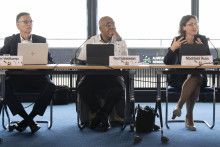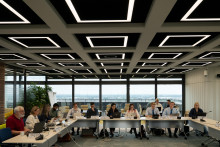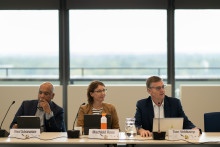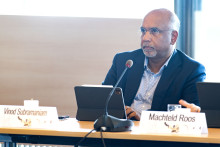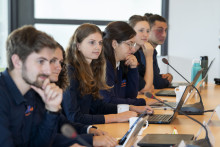Temporary sports and cultural facilities much needed
The UT's rapid growth is causing capacity problems for sports and cultural facilities on campus. An air-supported dome and temporary dance hall should provide short-term relief. The University Council (UC) expressed its satisfaction with the proposed measures. 'After all, if we want to grow as a university, our facilities have to grow too,' Tim Achterkamp (UReka) said. However, according to the UC, there are also a number of issues the UT needs to take into account. 'What about rising energy costs, for example? As the energy consumption of the temporary facilities will be high.'
In addition, he asked the Executive Board to pay attention to the year cycle, as the temporary dance hall will be located near the university library. 'We want to prevent students from being disturbed while studying. The same goes for campus residents who live close to the new facilities. Finally, of course, we hope that permanent facilities will soon be realised on campus.' In response, Machteld Roos (vice-president of the Executive Board) stated that the UC's advice will be taken into account.
Remove ‘losse flodders’ from annual report
The 2020 annual report was 'written too positively' and lacked critical reflection, the UC stated last year. For this year, the Council is more pleased with the document. 'We asked for an honest report,' said Pieter Boerman (Campus Coalition). ‘And I think it's moving in that direction with the 2021 annual report.' Still, the UC came across a number of marketing terms. ‘Several times quotes like ‘UT is voorloper’ had been stated. The Council advises to avoid ‘losse flodders’ in annual reports and to elaborate on the evidence for these statements.’
English proficiency
The topic of English language proficiency of international UT students was discussed again. This issue was already raised in 2021 when both the UC and the Platform for International Affairs (PIA) suggested a revision of the English language admission requirements at the UT. As a result, the Executive Board commissioned a working group to produce a proposal for amendments.
The proposal, now submitted to the UC, suggests that the UT should not necessarily tie its entry requirements to those of other universities, and that a post-enrolment language assessments for new students might be a viable option.
The Council agreed that the UT should set its own standards. However, they’d prefer to raise the English requirements above the other universities. ‘As UT, we are very proud of our project based learning. This requires more communication skills,’ said UReka member Jaime de Bruin. ‘The council liked the suggestion of post enrolment English level testing. The PELA system was proposed, as it is used at other universities, but we think that the PELA should be expended with a speaking part. Also, we would like to know what happens if a student doesn’t pass. Can they retake it? This needs to be looked into.’
‘We want to resolve the problem of English quality among students,’ replied rector Tom Veldkamp. ‘I will propose to the University Committee on Education to start a pilot on this. Some programmes have more problems than others. We could therefore ask one of the programmes with problems to pilot this approach. Based on that, we can see if it makes a difference and what is actually required.’
Frustrations about Unit4 software
The UT switched to a new financial system, from the company Unit4, at the beginning of this year. Recently, the UC received several complaints about the new system from within the UT community. These frustrations concern user-friendliness, extra workload and the 'link' with AFAS. 'The good news is that we all got our salaries,' Pieter Boerman said during the meeting, drawing some laughs. 'But there are signs of problems. I would like to hear from the Executive Board what risks this poses to our operations.'
Moreover, Boerman and Emile Dopheide (Campus Coalition) wanted to know what lessons the UT will learn from the introduction of Unit4 and AFAS. 'We don't blame Finance,' Dopheide insisted. 'But what can we learn from the past period? I feel that things were started too quickly and were not tested properly.'
According to Machteld Roos, the risks are limited. 'All information is available through the new system. If there are any questions, it is best to contact Finance by phone. That often works better than mail. The only risk with this is that it takes a lot of time. We can, however, do a better job of communicating the process in the future. Also, we will definitely take the lessons learned into account. I expect we will be able to say more about that in the new year.'
Bicycle plague
It is a recurring phenomenon every year: the huge number of bikes on O&O Square in September. This is why the UT employs ‘bike stewards’ to keep the square safe and accessible. Yet, the UC received signals that these stewards are not always friendly and clear in their communication. Let them point out where bicycles are allowed to be parked, a Council member suggested during the light-hearted discussion. President Vinod Subramaniam agreed. 'But I also heard that staff and students are sometimes rude to the stewards. I think the most important thing is that we all treat each other respectfully at the UT.'


